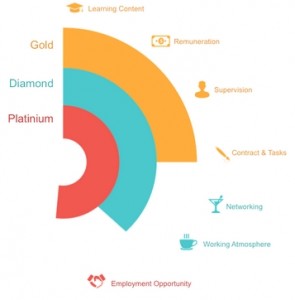For most young people, internships are the first step towards the labour market during or right after their degree. It is counted to be around four and a half million interns in the EU per year, from which -and this is the most striking part- 59% are unpaid, 40% have no contract (meaning, short social protection and no clarity of the tasks to be carried) and 30% have no learning content, whereas internships are acknowledged to be a crucial learning experience instead.
Youth organisations such as the European Youth Forum (YFJ in their acronym) have been advocating for long on youth rights and on quality internships. Some influential publications on the topic have been released so far, such as the booklet Quality jobs for young people and, more recently, the European Quality Charter on Internships and Apprenticeships, a charter with the basic guidelines for internships that are of quality and valuable for young people. Moreover, with the help of several partner organisations, the YFJ organised the first Europe Interns’ Day, taking place on July 18th in Brussels and which gathered over 200 people, according to the official figures by the YFJ.

Protesting under sunny Brussels for quality internships
Hence, the day started with interns and members from the European Youth Forum’s member organisations took over Place Luxembourg (the square right next to the European Parliament, also known as ‘Plux’ by the euro-bubble inhabitants) to protest against unpaid and unfair internships as a “modern way of slavery and exploitation”.
Under the (mostly unexpected) Brussels’ sun, the protesters could hear the voices of representatives of several youth organisations, such as InternsGoPro, Generation Europe and also AEGEE, which was represented by our Projects Director, Miguel Gallardo Albajar. We could also hear the words from the leaders of Génération Précaire, a French youth organisation that successfully pushed for changes in the law for internships and apprenticeships in France.
The discussion moved forward to the European Parliament, with a panel discussion that was firstly welcomed by Léa Hannaoui-Saulais, member of AEGEE-Lille and the Eastern Partnership Project who also presides EPSA, the European Parliament Stagiaires Association, which aims to empower the interns at the EP. “I have done five internships; four of them have been unpaid. I had done this because I was sure that would be useful for further professional experience”, she aknowledged, and she pointed that unpaid internships are indeed undervalued in tasks and salary and increases the risk of labour abuse. “We should start believing in ourselves”, she said, “but also companies must play their part”.
Commissioner Vassiliou: “interns are not to meant make coffees”

One of the highlights of the day was the address of the Commissioner on Education and Youth, Androulla Vassiliou. She was clear on the role internships play on an individual’s learning process: “internships are a learning experience, but not in an abstract way. Interns are not volunteers”, she said. “And, foremost, interns are not there to make coffees”.
She recognised internships as “more than just a supplement to formal education” and that a quality assurance is needed in order to make a good transition towards the job market. Commissioner Vassiliou also stressed the role of internships in order to gain “soft and interpersonal skills”.
In the question round, the Commissioner was asked about her term in office, which will soon come to an end, and the legacy that she has left to her successor. “My legacy will be built on the transition to the labour market”, she stated. “I did my best in order to bridge the gap between education and employment and between skills mismatch”. Her successor, Vassiliou said, “will build their work on that”.
The launching of the European Label of Quality Internships
The importance of taking fair internships with a strong learning content was stressed throughout the event, but is there any method that can be used to evaluate the quality of internships? Well, one of the aims of the event was actually the launch of the European Label of Quality Internships by the organisation InternsGoPro. With this rating method, InternsGoPro enable interns to rate their company’s practices according to a specific criteria, and also gives visibility to the best employers that ensure that their internships bring an added value to their interns.

The label rates which are the best employers by the following seven criteria: Learning content, Remuneration, Supervision & Mentorship, Contract & Clarity of Tasks, Networking, Working Atmosphere and Career development. Each criterion corresponds to a certain number of points which determine whether an internship offer is eligible for a Label. Furthermore, there are three types of labels according to the punctuation: Gold, Diamond and Platinum.
Therefore, not only interns themselves can benefit from checking which are the best places to take up an apprenticeship, but also employers and companies are interested. Acording to Régis Pradal, co-founder of InternsGoPro, this is a label that “can give high visibility and reputation”, through employer branding, e-recruitment of new talents and consulting.
Through bottom-up initiatives like this, the partner organisations believe that a light will be shed on the conditions under which many interns are, “a modern way of work exploitation” as it was mentioned in Place Luxembourg’s protests. If you wish to take a look at InternsGoPro’s project and even rate your own internship, you can check their website.
Written by Anna Gumbau, AEGEE-Barcelona
Pictures by the European Youth Forum and Project 668

